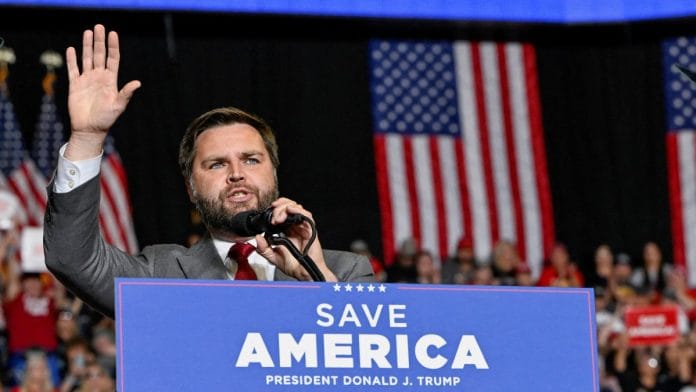The simmering China–US tariff dispute has exploded into a war of words—memes, fury, and diplomatic rebukes included—after US Vice President JD Vance claimed that “we (America) borrow money from Chinese peasants to buy the things those Chinese peasants manufacture.”
His use of the term ‘peasants’ struck a nerve in China. The comment went viral on Chinese social media platforms, sparking a wave of outrage. By 10 April, related hashtags had amassed millions of views on Weibo.
One Weibo post labelled Vance’s language as “backward, vulgar, and inferior”, while the editor-in-chief of China.com accused him of being vicious toward China.
Analysing Vance’s comments
Chinese internet users and commentators were quick to unpack Vance’s comments. While the term ‘peasant’ may have rural connotations, it now carries the implication of being uncultured or low-class in Western discourse. In this context, a Baidu commentary suggested that Vance’s remark laid bare the systemic arrogance of the American political elite, revealing how developing countries are often reduced to caricatures. The commentator, with over a million followers, noted that had a Chinese official referred to American farmers as “rednecks”, outrage would have been swift.
Another Chinese commentator argued that this was no accidental gaffe; it was an ideological slip reflective of a neo-Cold War mentality. Vance, known for verbal missteps, appears to rely on such inflammatory rhetoric to deflect from domestic woes and rally his political base, while championing President Donald Trump’s protectionist tariff policies. His past remarks, including controversial comments about Europe at the Munich Security Conference, have only added to his notoriety.
A Shanghai Observer piece went further, suggesting that Vance’s comments were not merely insulting, but part of a calculated strategy to scapegoat China for consolidating domestic support. Since taking office as the first millennial vice president, Vance has aligned himself with the ‘Make America Great Again’ agenda, and has continued to make divisive, and often demeaning, public statements.
Commentator Shi Zhingping pointed out the irony: the US designed a global economic system in which it held sway over high-end manufacturing and finance, while outsourcing low-end production to countries like China. Now, with China responsible for 35 per cent of global manufacturing output, this balance has shifted, upsetting the very system Washington once built.
Several posts and articles linked Vance’s remarks to efforts to sway both American and global opinion. His “economic nationalism” is seen as political posturing, a hollow echo of the America First agenda. The rhetoric reflects US anxiety over global competition and growing doubts about its own economic model, hinting at deeper concerns over the decline of American hegemony and the deadlock of its trade war.
Also read: How is China reacting to Trump’s trade war? With comedy, of course
Reactions highlighting Chinese superiority
Vance’s remarks have inadvertently led to Chinese commentators highlighting China’s growing pride in its industrial and technological progress. Social media users swiftly contrasted his rhetoric with reality, pointing out that the average life expectancy of these so-called “hillbillies” now surpasses that of Americans, and that China produces 78 per cent of the world’s solar panels, 90 per cent of rare earths, and holds $759 billion in US debt. Far from being backward, Chinese farmers are at the heart of a modern supply chain—from the Quyuan plough to 5G-enabled agriculture, blockchain logistics, high-speed rail, and electric vehicles. As one user put it sarcastically, if China’s “hillbillies” are the ones lending the money, perhaps it is time the US started repaying them via Alipay.
Another Weibo user observed that Chinese farmers enjoy the world’s longest high-speed rail network, cutting-edge electric vehicles, low crime, affordable healthcare, and some of the world’s most advanced cities. For many, Vance’s remarks stemmed from frustration that China has outgrown its role as a low-cost manufacturing hub and now stands as a peer competitor. Many commentators urged him to visit China and witness the transformation firsthand.
Responses to Vance’s comments turned increasingly personal. One post juxtaposed the Vice President’s disdain for Chinese farmers with the state of his own hometown in Ohio plagued by a drug epidemic and urban decay. “Chinese farmers built the high-speed rail and feed 1.4 billion people,” the post read, “while American ‘rednecks’ can’t even build a Tesla.”
Some reflected on Vance’s own background: once a child of hardship, he built a political career on his rise from poverty. Yet his choice of words suggested a selective empathy—reserved only for the American working class—and a deliberate distancing from his own roots. His blunt rhetoric, while perhaps resonating with some, is seen as unprofessional and undiplomatic coming from a vice president.
Also read: A weakened India is trying to make friends with China again. It has already failed twice
Rising anti-American sentiment
The online backlash to Vance’s remarks reflects a growing wave of anti-American sentiment on Chinese social media, amplified by state-affiliated platforms. Many commentators framed China as resisting external pressure, casting Vance’s language as further proof of US arrogance and bolstering confidence in the Chinese leadership, portrayed as standing firm against a global bully. The dominant narrative painted China as a developing country unfairly targeted by a Western hegemon, though this sat oddly alongside frequent assertions of China’s manufacturing and technological dominance. Vance’s comment has become a flashpoint in a larger contest of narratives and status.
He may now be among the most disliked foreign politicians in China, but the backlash reflects a deeper frustration with Western condescension. The discourse suggests that Chinese views on global power are hardening, with growing distrust between Beijing and Washington—and little sign that either the rhetoric or the underlying tensions will ease anytime soon.
Sana Hashmi is a fellow at the Taiwan-Asia Exchange Foundation. She tweets @sanahashmi1. Views are personal.
(Edited by Aamaan Alam Khan)







He also did not endear himself to the Europeans at the Munish Security Conference. History will judge the weakening of the transatlantic alliance as a spectacular diplomatic loss for the United States.